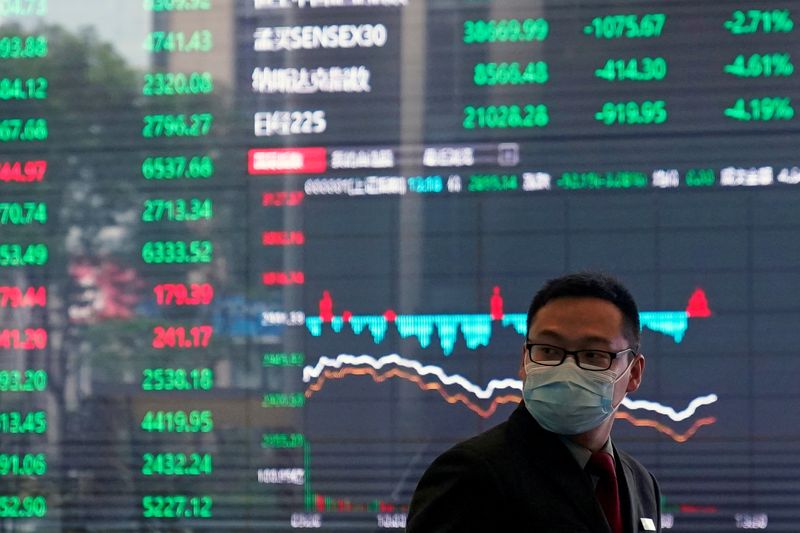This post was originally published on this site
https://i-invdn-com.akamaized.net/trkd-images/LYNXMPEG4C24B_L.jpg
(Reuters) – Asian equities were set to slump on Thursday after the head of the Federal Reserve warned of a “significantly worse” U.S. recession than any downturn since World War Two because of coronavirus pandemic fallout, sentiments that drove bonds higher on a safety bid.
Fed Chair Jerome Powell on Wednesday issued his sober review of an economy slammed by a record pace of job losses and bracing for worse ahead as most U.S. states moved toward reopening following lockdowns aimed at curbing the spread of the virus.
Hong Kong’s Hang Seng index futures (HSI) <.HSIc1> slipped 0.92%, Australian S&P/ASX 200 futures fell 1.07%, while {{178|Japan’s NiNikkei 225 futures rose 0.05%.
“We’re picking up from what was a negative session in offshore markets – New York in particular,” said Ray Attrill, head of foreign exchange strategy for National Australia Bank (OTC:NABZY) in Sydney.
A pushback against Powell’s “downbeat assessments” about U.S. economic risks and his rejection of the idea of using negative interest rates as a tool for economic recovery “will spill into the Asia session,” Attrill said.
Wall Street’s three major indexes closed lower for the second day in a row, the Dow Jones Industrial Average (DJI) fell 2.17%, the S&P 500 (SPX) lost 1.75%, and the Nasdaq Composite (IXIC) dropped or 1.55.
Still, Powell downplayed of the idea of using negative interest rates pushed the U.S. dollar higher against a basket of currencies.
The U.S. Dollar Currency Index, which measures the greenback’s strength against six major currencies, was up 0.23% on the day at 100.26. The index fell as low as 99.57 earlier in the session.
Powell’s comments followed a sharp selloff in equities on Tuesday after a warning from leading U.S. infectious disease expert Anthony Fauci that the virus was not yet under control. Fauci’s comments prompted concerns about how the economy would emerge from weeks of virus-related lockdowns.
Authorities in Wuhan, the Chinese city where the novel coronavirus emerged, has launched an ambitious campaign to test all of its 11 million residents, after a cluster of new cases raised fears of a second wave of infections.
But a decision by an independent board overseeing billions in U.S. federal retirement dollars that it would indefinitely delay plans to invest in some Chinese companies also helped to fuel Wednesday’s decline.
The administrators froze the plan days after the Trump administration told it to “halt all steps” tied to shifting its $40 billion international fund to track the MSCI (NYSE:MSCI) All Country World ex-U.S.A. Investable Market Index
In commodity markets, oil prices fell about 2% despite the first decline in U.S. crude inventories since January, following Powell’s remarks that a rebound may take awhile.
The slide followed an earlier rally on optimism that slumping fuel demand would recover, while producers have slashed production to cut the mounting supply glut during the pandemic.
Global benchmark Brent crude settled down 79 cents, or 2.6% at $29.19 a barrel. West Texas Intermediate crude futures, the U.S. benchmark, settled down 49 cents, or 1.9% at $25.29 a barrel.
Yields on benchmark U.S. Treasury 10-year notes last fell 1/32 in price to yield 0.6525%, from 0.651%..
MSCI’s broadest index of Asia-Pacific shares outside Japan rose 1.09 points or 0.23 percent, to 471.99.

